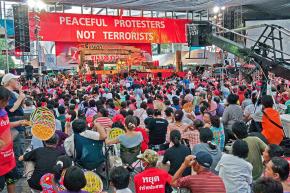Thai army prepares its assault
A military crackdown against pro-democracy demonstrators was in the making in the streets of Bangkok after the regime of Prime Minister Abhisit Vejjajiva again rejected proposals for negotiations and a ceasefire.
The demonstrators, known as Red Shirts because of their clothing, have been mobilized, thousands strong, in the center of Bangkok for two months, demanding immediate elections. Leaders of the Red Shirts in the United Front for Democracy Against Dictatorship (UDD) have offered to participate in talks mediated by the United Nations.
But the military-backed Abhisit government has chosen repression. Dozens of protesters and bystanders are dead from soldiers opening fire on crowds of people and army snipers on downtown rooftops picking people off. The crackdown took an ominous turn on the morning of May 19 as armored personnel carriers massed outside the protesters' encampments. In response, protesters moved children and vulnerable people to a nearby temple.
Predictably, the Western media is repeating the claims of the regime that protesters are to blame for the violence. But the protesters are comprised mainly of the rural poor who oppose the Thai government, which came to power in a military coup.
is a Thai dissident who was accused of "lese majesty"--essentially, not being loyal to Thailand's king--and forced to flee the country last year. He has continued to provide a left-wing analysis of events in Bangkok. On Wednesday, he debated a critic of the Red Shirts on Democracy Now! Here, he writes on the issues at stake in this confrontation in a blog post originally titled "What would end the violence in Thailand?"
IF THE military-backed government of Abhisit Vejjajiva dissolved parliament, announced fresh elections and ordered a cease-fire, the violence would end immediately and the Red Shirts would all go home.
In capitalist democratic countries, when there is a crisis, dissolving parliament and calling elections is a normal way to defuse serious tension. In the 1970s, British Prime Minister Edward Heath called elections when faced with a massive strike wave. In 1968, the French government called elections in the face of a crisis.
The Abhisit government can only cling to power by shooting civilians, announcing a state of emergency in a quarter of the country, and censoring the media and the Internet. If the government wants to claim legitimacy it should submit to the wishes of the people through a general election and prove that it has legitimacy.
The UDD leadership of the Red Shirts has called for an immediate ceasefire and talks with the government. This would also end the killing and violence.
Yet Abhisit has refused. Instead, he and the army generals have sent snipers and assassination squads into the center of Bangkok to kill unarmed civilians in their so-called "live-fire zone." Sixty-five people have been killed since April and nearly 2,000 injured. Among the dead are paramedics, journalists and at least one young boy, a 10 year old.

The government continues to lie about the military actions and continues to lie that the Red Shirts are "armed terrorists." Numerous media reports from the BBC, CNN and ABC show this not to be true.
One important reason why the government will not end the violence is that it knows that it would lose an election. It was never elected in the first place and is only in power because of the army and the judiciary that have repeatedly frustrated the democratic process since the 2006 coup.
The government, the military, the palace, the majority of the business class, the judiciary and the top bureaucrats are the elites. For years, they have used their extra-constitutional power to exploit and repress the majority of the population. They have shot down pro-democracy demonstrators in 1973, 1976, 1992, 2009 and now in 2010.
This is a class war. But only the naïve believe that class war is a simple matter of rich against the poor. The Red Shirts represent workers and small farmers. They are the people who have created the wealth in Thailand, but they have not been able to enjoy the benefits. Thailand is a very unequal society.
The hopes of the majority were raised when millionaire Thaksin Shinawatra's Thai Rak Thai government offered a universal health care scheme and pro-poor policies. They were inflamed when the elites stage a coup against this elected government in 2006. Now they are standing firm and facing the armed might of the ruling class.
For the above reasons, the Red Shirt protest in the center of Bangkok is legitimate, even if it disrupts commercial life in expensive shopping centers and luxury hotels. Anyone who believes in democracy and social justice should support them.


